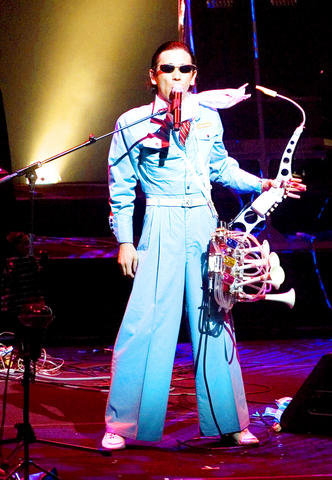The lights dim and a spotlight shines on the lean, bespectacled Japanese man in a blue worker's jumpsuit strapped to a metallic winged device with wires and switches.
Seconds later, in a sci-fi-meets-rock-circus moment, he breaks into a series of hip-twisting, finger-snapping movements that produce a sequence of knocks from the ends of the wings.
Meet Nobumichi Tosa, president of Japanese art outfit Maywa Denki.

PHOTO: AFP
His ensemble of nonsense instruments includes flower-shaped xylophones, singing robots and dancing puppets, all powered by 100 volts of electricity.
Started in 1993, Maywa Denki, which means Maywa's Electric in Japanese, is a fictitious company which Tosa uses as a platform to promote his art.
"Maywa Denki is very famous in Japan, like Sony, Panasonic and Microsoft," Tosa joked to his audience during a recent performance called Mechatronica at Singapore's premier art complex, The Esplanade.
It was a bizarre 80-minute play of technology and mechanics.
Tosa, 40, and three other jumpsuit-clad men, played Japanese ballads and rock songs using home-made instruments, complete with cheesy choreography and Japanese comic kitsch.
Maywa Denki, which has also toured France, Austria and Hong Kong, is named after his father's bankrupt vacuum tube factory.
Speaking through an interpreter, Tosa said that in a bid to win public acceptance for his art, he packaged his four-man unit as an "electrical company" and developed off-beat inventions and performances.
The creation struck a chord with Japanese audiences.
"They love inventions. They say there is one inventor in each town," said Tosa.
He calls his art works "products" and his exhibitions and performances "product demonstrations." His 300-strong fan club is a "union," as in trade union.
Tosa said he used to play synthesizers but lost interest in normal instruments and decided to invent his own.
Inventive spirit
While the company's primary purpose is making art, Maywa Denki has also come up with more than 100 "products" including a wind-up toy called The Knockman which is sold in the US, France and Hong Kong.
Some of Tosa's instruments can be made to order in Japan.
"It is a company making nonsense, useless products, but very seriously," said Tosa, whose jumpsuit symbolizes the small and medium electrical enterprises that supported Japan's economy during its high-growth period in the second half of the 20th century.
He declines to say how much revenue the company makes but says it is profitable.
Tosa is unabashed about making a sales pitch during his Singapore performance.
"I introduce you our product - automatic tap-dance shoes," Tosa announced while snapping his fingers, which were linked by wires to the shoes, to produce a series of flamenco beats from the footwear. Tosa said malfunctions and electrocutions are common during the shows.
The sound from his complex machines is unpolished and mostly acoustic - a counter to the wildly-popular iPods and similar portable music players whose sound Tosa considers "more data and information than real music."
Tosa's proudest musical invention so far is a singing robot known as Seamoon that has enabled Maywa Denki to conduct performances solely with machines, including self-strumming guitars and automated xylophones.
"I wanted to make the ultimate instrument. The most difficult thing is to make the machines reproduce the human being's voice," he said.
Asked what his favorite creation is, Tosa replied: "Me! I am a machine. The most complicated and the most incomprehensible."

April 28 to May 4 During the Japanese colonial era, a city’s “first” high school typically served Japanese students, while Taiwanese attended the “second” high school. Only in Taichung was this reversed. That’s because when Taichung First High School opened its doors on May 1, 1915 to serve Taiwanese students who were previously barred from secondary education, it was the only high school in town. Former principal Hideo Azukisawa threatened to quit when the government in 1922 attempted to transfer the “first” designation to a new local high school for Japanese students, leading to this unusual situation. Prior to the Taichung First

The Ministry of Education last month proposed a nationwide ban on mobile devices in schools, aiming to curb concerns over student phone addiction. Under the revised regulation, which will take effect in August, teachers and schools will be required to collect mobile devices — including phones, laptops and wearables devices — for safekeeping during school hours, unless they are being used for educational purposes. For Chang Fong-ching (張鳳琴), the ban will have a positive impact. “It’s a good move,” says the professor in the department of

On April 17, Chinese Nationalist Party (KMT) Chairman Eric Chu (朱立倫) launched a bold campaign to revive and revitalize the KMT base by calling for an impromptu rally at the Taipei prosecutor’s offices to protest recent arrests of KMT recall campaigners over allegations of forgery and fraud involving signatures of dead voters. The protest had no time to apply for permits and was illegal, but that played into the sense of opposition grievance at alleged weaponization of the judiciary by the Democratic Progressive Party (DPP) to “annihilate” the opposition parties. Blamed for faltering recall campaigns and faced with a KMT chair

Article 2 of the Additional Articles of the Constitution of the Republic of China (中華民國憲法增修條文) stipulates that upon a vote of no confidence in the premier, the president can dissolve the legislature within 10 days. If the legislature is dissolved, a new legislative election must be held within 60 days, and the legislators’ terms will then be reckoned from that election. Two weeks ago Taipei Mayor Chiang Wan-an (蔣萬安) of the Chinese Nationalist Party (KMT) proposed that the legislature hold a vote of no confidence in the premier and dare the president to dissolve the legislature. The legislature is currently controlled